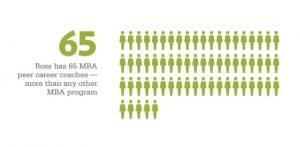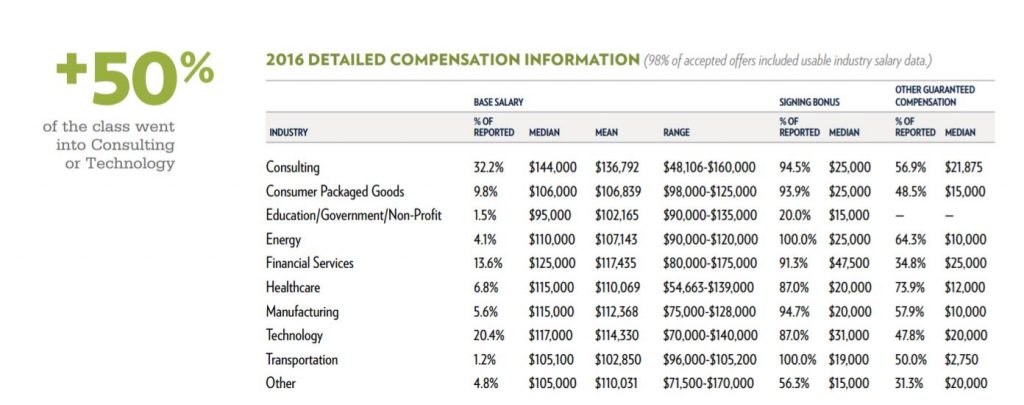A Deeper Look at the 2016 Michigan Ross Employment Report

The University of Michigan’s Ross School of Business earlier this month released its 2016 MBA Employment Report, and the results are nothing short of stellar.
A staggering 98.4 percent of MBA grads earned a job three months after graduating, according to the report, representing a slight uptick from the previous year’s 97.4 percent. For comparison, Stanford Graduate School of Business (GSB) reports that 90 percent of its 2016 grads had a job 90 days out from graduation, down from 92 percent the year before. Ross grads with jobs waiting for them the day they graduated also inched upward this year over last, from 92.4 percent to 93.5 percent.
While those numbers are indeed striking, perhaps the most telling figure of Ross’ recent success is the median total compensation of its MBA graduates, clocking in at a staggering $150,606—trailing only Stanford GSB, Harvard Business School and the University of Pennsylvania’s Wharton School among schools that have already released employment reports this year.
Ross touts that it has 65 peer career coaches, more than any other MBA program, which could contribute to the success of its graduates in landing jobs.
Who’s Hiring?

An infographic from featured in the 2016 Michigan Ross Employment Report
No company snatched up more Ross students than London-based auditing firm PricewaterhouseCoopers (PwC)—if you take into account every student hired from the school’s undergraduate, part-and full-time MBA and assorted masters in management programs. But looking just at hiring of full-time MBA students and grads, Amazon hired more Ross interns (29) and more Ross recent MBA grads (31) than any other company in 2016.
After Amazon and PwC, the third largest employer of Ross 2016 graduates was management consulting mega-firm McKinsey & Co. (16), followed by Deloitte, Microsoft and Boston Consulting Group, which each hired 14 Ross grads. Companies like Goldman Sachs, EY and Morgan Stanley, among others, were also high on the list of 2016 hiring firms.
The consulting industry attracted by far the greatest slice of the Ross MBA grad pie—nearly one in every three grads, or 32.2 percent, followed this path. The median income of those heading into consulting was also the highest of the class, at $144,000, although the salary range of graduates going into consulting was also the widest, from a low of $48,000 to a high of $160,000.
Following consulting was technology, which drew 20.4 percent of Ross MBA grads. Those joining the tech industry earned a median salary of $117,000 with a lofty average signing bonus of $31,000. Trailing tech was the finance industry, which hired 13.6 percent of the graduating class.

Compensation stats for recent grads from the 2016 Michigan Ross Employment Report
What About Class Diversity?
Of the 448 total MBA graduates from Ross this year, 32 percent were female, 11 percent were U.S. minorities and 33 percent were international students. The majority of graduates—70 percent—hailed from North America, 11 percent from India and another 11 percent from elsewhere in Asia.
The average age of students in the graduating class is 30 years old. Students joined with an average GPA of 3.4 and an GMAT score of 701. (The GMAT range was 650 to 740).
Internships
The industries chosen by Ross Class of 2017 students for summer internships varied some from the full-time positions taken by graduates of the Class of 2016. For internships, more than a quarter of the class—25.2 percent—headed into tech, more than any other sector. Consulting came in second at 22.8 percent, followed by financial services in third place, drawing 13.1 percent of the class. The remaining students headed off into internships across a range of industries, including consumer goods, manufacturing, healthcare, energy and education/government/nonprofit.
The majority of Ross’ 423 interns—35 percent—opted to remain in the Midwest, including a concentration of 15.2 percent in and around Chicago. The U.S. West Coast was the next largest draw, enticing 28.9 percent. The northeastern region of the United States drew 14.3 percent of Ross interns, while another 7.3 percent of students opted to spend their summer abroad interning for international companies.
After Amazon, the company that brought in the second most Ross interns from the Class of 2017 was Microsoft (16), followed by McKinsey & Co. (11), Deloitte (10) and Boston Consulting Group (10).
Click here for a more in-depth look at the 2016 Michigan Ross employment report and take a look at our Ross school profile, detailing the school’s Executive MBA program located in Los Angeles.
This article was republished with permission from Clear Admit.
